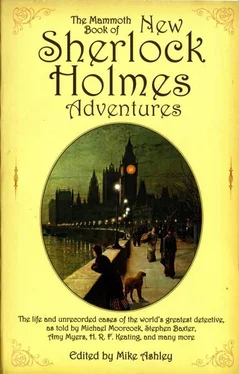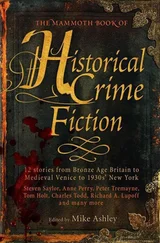Mike Ashley - The Mammoth Book of New Sherlock Holmes Adventures
Здесь есть возможность читать онлайн «Mike Ashley - The Mammoth Book of New Sherlock Holmes Adventures» весь текст электронной книги совершенно бесплатно (целиком полную версию без сокращений). В некоторых случаях можно слушать аудио, скачать через торрент в формате fb2 и присутствует краткое содержание. Жанр: Детектив, на английском языке. Описание произведения, (предисловие) а так же отзывы посетителей доступны на портале библиотеки ЛибКат.
- Название:The Mammoth Book of New Sherlock Holmes Adventures
- Автор:
- Жанр:
- Год:неизвестен
- ISBN:нет данных
- Рейтинг книги:5 / 5. Голосов: 1
-
Избранное:Добавить в избранное
- Отзывы:
-
Ваша оценка:
- 100
- 1
- 2
- 3
- 4
- 5
The Mammoth Book of New Sherlock Holmes Adventures: краткое содержание, описание и аннотация
Предлагаем к чтению аннотацию, описание, краткое содержание или предисловие (зависит от того, что написал сам автор книги «The Mammoth Book of New Sherlock Holmes Adventures»). Если вы не нашли необходимую информацию о книге — напишите в комментариях, мы постараемся отыскать её.
Marianne is an important fictional formulation of Sand's thinking on the role of women and the nature of democracy. This edition includes a long biographical preface which quotes extensively from her correspondences.
The Mammoth Book of New Sherlock Holmes Adventures — читать онлайн бесплатно полную книгу (весь текст) целиком
Ниже представлен текст книги, разбитый по страницам. Система сохранения места последней прочитанной страницы, позволяет с удобством читать онлайн бесплатно книгу «The Mammoth Book of New Sherlock Holmes Adventures», без необходимости каждый раз заново искать на чём Вы остановились. Поставьте закладку, и сможете в любой момент перейти на страницу, на которой закончили чтение.
Интервал:
Закладка:
She received us in the morning room. Lady Cynthia was a tall, fair, young woman, on whom sombre black sat well.
"Mr Holmes, Doctor", she said. "My father would have welcomed the opportunity to meet you. He read your accounts, Doctor, of Mr Holmes's cases, with great pleasure and approved of your application of logic."
"It is kind of you to say so," said Holmes, "and I could have wished to meet in happier circumstances, but it is about your father that we have called."
"About my father?" she queried. "Surely you do not believe that there is anything suspicious about his death? Sir William Greedon believed the cause to be an old infection from his Egyptian explorations, similar to that which carried off my poor brother."
"You must not assume that my involvement indicates a crime, Lady Cynthia. The press has linked Sir Andrew's death with the so-called Curse of Addleton…"
"That is mere vulgar sensationalism," she interrupted. "We experienced the same nonsense at the time of Anthony's death."
Holmes nodded, sympathetically. "Nevertheless," he said, "I have reliable information that Addleton has suffered some strange infection since Sir Andrew opened the Black Barrow."
"Surely you do not believe in the Curse, Mr Holmes!"
"No madam, not for one moment, but I have often observed that what the superstitious or the lazy-minded call supernatural or coincidental is, in fact, the occurrence of two striking events which have a common cause or share a connection. I believe that such may be the case here."
"If it will prevent deaths such as my brother's and my father's," said Lady Cynthia, "then of course I will assist your enquiries. How can I help you?"
"You might tell me what it was that occupied Sir Andrew's mind in his last days, Lady Cynthia."
An expression of pain passed across her features. "When he first fell sick," she began, "he became anxious to write up his paper on Addleton. He had never published it, you know, because of the row with Edgar. But he never completed it, for he would fall into strange excitements and sudden obsessions."
"And what form did they take?" asked Holmes.
"He began to blame himself for my brother's death. When his own health was already failing, he insisted on travelling alone to Addleton, saying that he must ask Tony's forgiveness. I pleaded
to travel with him, if he must go, but he said that he must go alone."
She gazed at the handsome portrait of her father which hung above the fireplace.
"After that his health deteriorated rapidly. While he was not yet confined to his bed he sat in his workshop, scribbling endlessly."
"Do you have any of his scribblings?" asked Holmes.
"No, Mr Holmes. I looked at them after his death and they were unconnected nonsense. I destroyed them."
"Might we see his workshop?" asked my friend.
"By all means," she replied and rose from her chair. We followed her to the rear of the house, where she led us into a long room, lit by three tall windows that overlooked an attractive garden. Its walls were lined with bookshelves and down the middle ran a long, solid table, littered with tools and scraps of various materials. In one corner stood a writing desk.
"This was always my father's working place," said Lady Cynthia. "Please feel free to make any examination that you wish. If you will join me in the morning room when you have done, I shall arrange some tea," and she withdrew.
Sherlock Holmes looked about him. "I think you had better take the books," he said.
"How do you mean?" I queried.
"Examine the bookshelves, Watson, for anything which occurs to you as out of the ordinary."
"But I am not sure that I know what an eminent archaeologist would ordinarily read," I protested.
He ignored me and began to pace around the big central table. I turned to the bookshelves and attempted the task that Holmes had set me. There were shelf upon shelf of archaeological journals, some in foreign languages, there were works on history, legend and folklore, but nothing that struck me as anomalous. Eventually I turned back to Holmes who was looking at some objects at one corner of the bench.
"He seems to have nothing here but professional reading," I observed.
"Very well," said Holmes. "Then we must make what we can of his work-bench," and he passed to me a small dark pad.
"Moleskin," I said, as soon as my fingers touched it, "A piece of moleskin folded over and stitched into a – a pin-cushion perhaps?"
"Moleskin," confirmed my friend, "but not a pin-cushion, I think. Smell it, Watson."
I lifted the little pad and my nostrils wrinkled. "Faugh!" I exclaimed, "it reeks of rancid tallow."
"Precisely," said Holmes, "and what about this?"
He picked up from the bench a curious wooden object and I took it from him. It was about eighteen inches long and rounded at one end to form a handle such as one would find on many tools, but above the handle it widened out, one side being flat and the other curved.The opposite end from the handle was cut quite flat. It was evidently a manufactured object and had been stained, though the curved and flat surfaces bore signs of impact.
"I've never seen anything like it," I said. "Are you sure it is complete?"
"Oh, it is quite complete," said Holmes, "and exactly what I expected to see. Now, I think it only remains to examine the writing desk."
The desk yielded little. The pigeon-holes had been cleared and there were two note-pads on the desk from which the upper sheets had been removed.
"Nothing here, Holmes," I said.
"I do not know, he replied, and slipping his lens from his pocket began an examination of the blank note pads. "Have you a cigarette, Watson?" he asked, suddenly.
I took out my case and opened it. "I see," said Holmes, "that the horses have not lived up to your expectations. You are reduced to cheap Virginias. Still, they will suffice," and he took one and lit it.
After a few vigorous puffs he leaned over the desk and tapped his ash onto one of the note-pads, rubbing it into the paper with his forefinger. After a moment he smiled.
"See," he said, lifting the pad, "the ash has darkened the paper, except where it has been compressed by the weight of a pencil on the sheet above. Now, what have we here?"
He held the paper to the light. "We have some decipherable words, Watson, and they seem to be 'poor Tony's death'. Now, what will the second pad reveal?"
Soon he had applied his process to the second pad and examined it. " 'Lead? Lead? Lead?' " he read from it, "Each time with a question mark. That-seems to be all on this one."
He crumpled the two ash-stained sheets into his coat pocket and straightened up. "I think," he said, "we should take our farewells of Lady Cynthia."
While we took tea with Lady Cynthia, Holmes assured her that he expected to unravel the mystery of her father's death and would communicate with her when his researches were complete. I, however, had been growing more mystified at each of my friend's moves and, in the cab back to Baker Street, I said so.
"Watson, Watson," he said, shaking his head. "It was you who drew my attention to this pretty little puzzle. Since then I have merely pursued a completely logical investigation into the mystery and have been able to acquire certain data which will, I firmly believe, lead me to a successful conclusion. You should know my methods well by now Surely you have some inkling?"
I shook my head.
"Then consider these important facts," he said, striking them off on his fingers as he announced them. "Firstly, the people of Addleton believe the Black Barrow to be accursed because grass does not grow and snow does not lie upon it; secondly, the County Medical Officer confirms that a strange disease struck the village after the opening of the barrow; thirdly, Mr Edgar believes, with good reason, that something was removed from the barrow illicitly. Does none of that assist you?"
Читать дальшеИнтервал:
Закладка:
Похожие книги на «The Mammoth Book of New Sherlock Holmes Adventures»
Представляем Вашему вниманию похожие книги на «The Mammoth Book of New Sherlock Holmes Adventures» списком для выбора. Мы отобрали схожую по названию и смыслу литературу в надежде предоставить читателям больше вариантов отыскать новые, интересные, ещё непрочитанные произведения.
Обсуждение, отзывы о книге «The Mammoth Book of New Sherlock Holmes Adventures» и просто собственные мнения читателей. Оставьте ваши комментарии, напишите, что Вы думаете о произведении, его смысле или главных героях. Укажите что конкретно понравилось, а что нет, и почему Вы так считаете.












